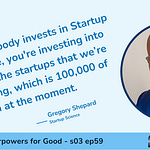I’m not a financial advisor and nothing I write in Superpowers for Good should be treated as investment advice. You should seek appropriate counsel before making investment decisions.
Devin: What do you see as your superpower?
James: The first thing that comes to mind in getting to know myself better is my inclusivity.
After attending the Global Clean Energy Action Forum hosted by the Department of Energy in Pittsburgh, James Wagoner, CEO of startup battery manufacturer Joule Case says, the DOE has billions to deploy for clean tech projects.
“Then you start to look at what they’re trying to do, and you start to realize that Joule Case can absolutely solve for all of these things,” he says. “As we’ve looked at the market now, it’s $120 Billion that we can really address ourselves.”
“We have five X sales growth compared to last year [2021],” James says. “We’ve broken over well over a million in sales compared to last year [2021], and we’re just getting started.”
James is excited about bringing retail investors into the company. “You can have those people affected on a day-to-day basis from clean energy also invest in and realize the financial upside in this transition.”
Joule Case’s Wefunder campaign is approaching $2 million raised. The crowd is stepping up to accelerate the startup’s growth trajectory and participate in the resulting profits.
The company started in 2015, addressing a niche opportunity. At trade shows, vendors with small 10 x 10 booths are often charged hefty fees—sometimes $500—to access power during the show. Joule Case provided batteries to vendors that allowed them to power their devices and displays during the show, avoiding the fees. Joule Case customers could reach payback after just two shows, James says.
From there, the company has grown in scale, both in terms of the size of the products it sells and the breadth of its market. Today, the company provides power to outdoor stages and events, allowing shows to avoid big grid connection fees and demand charges or the noise and pollution involved with big generators.
James is also excited by the company’s new Li6k battery that provides six kWh of power. The food truck industry is buying them up. “We just installed one into a hot dog street vendor in New York City,” James says, noting that there are 10,000 street vendors there.
“A couple of times now, we’ve deployed not just for a singular food truck, but for a dozen, 20, 25 food trucks using our large battery systems where you don’t want to stall individual batteries, but for this one event or while they’re at this one plaza, they can connect up like it is shore power and you’re not tied into the grid,” he says.
We’ve all been to events where a dozen food trucks are all parked, running noisy, smelly generators that ruin the atmosphere organizers hoped to create.
Joule Case is building a brand to replace diesel generators in the small to medium enterprise space. “Our customers come to us and say, ‘Hey, can you guys power this?’ And the answer always is ‘Absolutely,’” James says.
“You’re dealing with the businesses that have larger ticket sizes,” he says. “A median sell order for us now is in the $20 to $25,000 [range] for each customer. It’s cash upfront. We’re not dealing with middlemen or distributors.”
James says that the SME space provides opportunities for Joule Case to demonstrate capabilities at scale that appeal to larger enterprises. He’s also excited by the opportunities to work with companies building EV charging infrastructure supported by the DOE.
“A level three DC charger is going to cost anywhere between $200 and $500,000 to get that type of wire, that capacity of service to that address, the charger itself and electronics,” James says. “Then as the utility looks at that type of demand, you know, that that facility owner that would be operating that charger is going to be looking at demand charges in the tens of thousands of dollars a month.”
Joule Case offers an alternative, James says. “Why do that when you can just set a portable battery there in its place?” That is just one of the many opportunities that excite him.
James is building the company by leveraging his superpower of inclusivity.
How to Develop Inclusivity As a Superpower
James uses inclusivity as a critical solution-finding strategy. “As things come up or as things are needed to be done, default mode goes into solving a problem. Who else can I reach out to and talk with that might have a different perspective that might know how to solve this problem better than I will?”
James sees the success of his equity crowdfunding for Joule Case as an example of the power of his inclusivity.
We now have over 1500 investors and being able to include them on this journey, whether they are starting to introduce their local food trucks or their businesses to Joule Case, they're giving us feedback on whatever the system might be. So, Joule Case is not just a company with some small amount of employees.
Instead, we are a well-marketed force when it comes to clean energy, backed by hundreds, almost thousands of investors and a community that's very strong, stacked with customers, advocates, advisors, just people that are excited to see this journey in building something that makes our world a better place.
James teaches two fundamental principles to develop an attitude of inclusivity.
The first is to get into the habit of simply asking, “Who else might be able to solve this problem for us?”
Success in that step builds on a more foundational principle. “There are lots of challenges, right? There are going to be a lot of highs and lows. No one’s perfect,” James says. “But what we do demand is that we’re always learning, we’re always getting better.”
By following James’s example and advice, you can make inclusivity a superpower that enables you to do more good in the world.
James will be speaking at SuperCrowd23. Don’t miss it!














